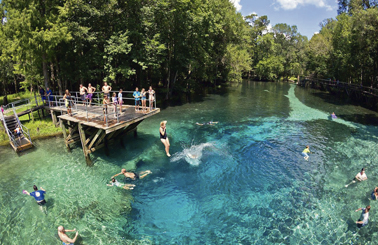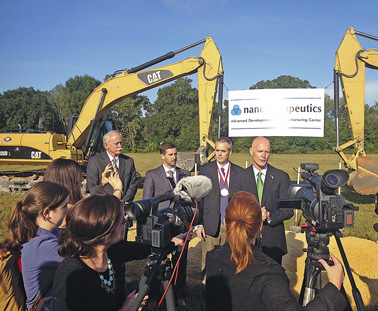Blue Springs on the market

Photo special to Alachua County Today/ Divers and swimmers at Blue Springs near High Springs. Kim Davis' family has owned the location since 1958.
HIGH SPRINGS – Kim Davis has run Blue Springs for nearly 27 years. The spring itself has belonged to her family for 55 years. But all of that may soon change.
Davis and her brother, Matt Bahr, are looking for someone to buy the spring they have held near to their hearts for the majority of their lives.
The family received the spring in 1958, and Davis’ parents have been involved in running it since. When both her mother and father passed away earlier this year, she decided it was time to move on.
“We have a couple of other family businesses as well and have been stretched fairly thin,” Davis said. “This is something we needed to do and decided now was the time.”
She was not alone in making the final decision. Bahr, who was also active in the family operation, agreed it was the right thing to do.
“We have been in this area since I was very young,” Bahr said. “But this was a wish my dad had before he died, he wanted us to sell.”
However, the family knows that it will not be easy to let go of the Blue Springs.
“It is with a very heavy heart that we look for a buyer for our spring,” Davis said. “This is definitely an emotional time.”
Davis said she is looking for someone to take the spring to a better place than she could. She wants to find a new owner that would do everything they could to protect it, she said.
“I have no preference of a public or private buyer,” Davis said. “But people need to realize, what goes into the ground comes out in the water, and I want someone to protect the water.”
The property is 401.6 acres and is located near High Springs at 7450 NE 60th Street.
While the spring has been on the market for just over five months, with a list price of $10 million, it has garnered some interest, Bahr said.
Another goal of the family is to see the new ownership keep the current employees on staff.
“There has been no harder working staff than we have had,” Bahr said. Some of them have been there working there for 10 to 15 years.
“They all know the spring like the back of their hand now,” he said. “It would take new people a couple of years to get fully up to speed on those things.”
“Anyone coming in to the situation would need to know that these people are the best and really enjoy their work,” Davis said. “We would no doubt express to them that we want that to keep going, and I hope they would appreciate the staff.”
The state of Florida has many springs in its state park program, and is a possible option as a buyer for Blue Springs. It is still unclear if a deal would be made between the two parties.
“I would not be opposed to anyone at this point,” Davis said. “Really, my ultimate goal is just to have someone that wants to keep it open and keep it protected.”
# # #
Email ahart@
alachuatoday.com
Add a comment




